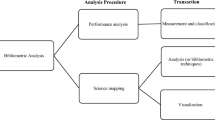Abstract
This article focuses on how and why the publication outlets in which academic writers’ work appears can impact on their citations, as part of a qualitative interview-based study of computer scientists’ and sociologists’ citing behaviour. Informants spoke of how they cited differently when writing in outlets aimed at a less knowledgeable audience, and for audiences from different disciplines and in different parts of the world. Citation behaviour can also be affected when writing for journals which favour different research paradigms, and the word limits journals impose led some informants to cite more selectively than they would have wished. The implications of the findings and the strengths and weaknesses of the interview-based method of investigation are also discussed.
Similar content being viewed by others
References
Abercrombie, N., Hill, S., Turner, B. S. (2006), The Penguin Dictionary of Sociology (5th ed), Penguin, London.
Bonzi, S., Snyder, H. W. (1991), Motivations for citation: a comparison of self citation and citation to others, Scientometrics, 21:245–254.
Borgman, C. L., Furner, J. (2002), Scholarly communication and bibliometrics. In: B. Cronin (Ed.), Annual Review of Information Science and Technology, Vol. 36. Information Today, Medford, pp. 3–72.
Brooks, T. A. (1985), Private acts and public objects: an investigation of citer motivations, Journal of the American Society for Information Science, 36:223–229.
Brooks, T. A. (1986), Evidence of complex citer motivations, Journal of the American Society for Information Science, 37:34–36.
Case, D. O., Higgins, G. M. (2000), How can we investigate citation behavior? A study of reasons for citing literature in communication, Journal of the American Society for Information Science, 51:635–645.
Chubin, D. E., Moitra, S. D. (1975), Content analysis of references: adjunct or alternative to citation counting?, Social Studies of Science, 5:423–441.
Cohen, L., Manion, L., Morrison, K. (2000), Research Methods in Education (5th ed), RoutledgeFalmer, London.
Cronin, B. (1984), The Citation Process: The Role and Significance of Citations in Scientific Communication, Taylor Graham, London.
Cronin, B. (2005), The Hand of Science: Academic Writing and its Rewards, Scarecrow Press, Lanham.
Cronin, B., Shaw, D. (2002), Identity-creators and image-makers: using citation analysis and thick description to put authors in their place, Scientometrics, 54:31–49.
Edge, D. (1979), Quantitative measures of communication in science: a critical review, History of Science, 17:102–134.
Harwood, N. (2006), (In)appropriate personal pronoun use in political science: a qualitative study and a proposed heuristic for future research, Written Communication, 23:424–450.
Harwood, N. (2007), Political scientists on the functions of personal pronouns in their writing: an interview-based study of ‘I’ and ‘we’, Text & Talk, 27:27–54.
Harwood, N. (2008), Citers’ use of citees’ names: findings from a qualitative interview-based study, Journal of the American Society for Information Science and Technology, 59: 1007–1011.
Harwood, N. (in press), An interview-based study of the functions of citations in academic writing across two disciplines, Journal of Praagmatics.
Holstein, J. A., Gubrium, J. F. (1995), The Active Interview, Sage, Thousand Oaks.
MacRoberts, M. H., MacRoberts, B. R. (1984), The negational reference: or the art of dissembling, Social Studies of Science, 14:91–94.
Merton, R. K. (1968), Social Theory and Social Structure, Free Press, New York.
Murugesan, P., Moravcsik, M. J. (1978), Variation of the nature of citation measures with journals and scientific specialities, Journal of the American Society for Information Science, 29:141–147.
Nystrand, M. (1989), A social-interactive model of writing, Written Communication, 6:66–85.
Odell, L., Goswami, D., Herrington, A. J. (1983), The discourse-based interview: a procedure for exploring the tacit knowledge of writers in nonacademic settings. In: P. Mosenthal, L. Tamor, S. A. Walmsley (Eds), Research on Writing: Principles and Methods. Longman, New York, pp. 221–236.
Shadish, W. R., Tolliver, D., Gray, M., Sen Gupta, S. K. (1995), Author judgements about works they cite: three studies from psychology journals, Social Studies of Science, 25:477–498.
Small, H. (1982), Citation context analysis. In: B. Dervin, M. J. Voight (Eds), Progress in Communication Sciences Vol III. Ablex, Norwood, pp.287–310.
Snyder, H., Bonzi, S. (1998), Patterns of self-citation across disciplines (1980–1989), Journal of Information Science, 24:431–435.
Thompson, G. (2001), Interaction in academic writing: learning to argue with the reader, Applied Linguistics, 22:58–78.
Thompson, G., Thetela, P. (1995), The sound of one hand clapping: the management of interaction in academic discourse, Text, 15:103–127.
Vinkler, P. (1987), A quasi-quantitative citation model, Scientometrics, 12:47–72.
Wang, P., White, M. D. (1999), A cognitive model of document use during a research project. Study II. Decisions at the reading and citing stages, Journal of the American Society for Information Science, 50:98–114.
White, M. D., Wang, P. (1997), A qualitative study of citing behavior: contributions, criteria, and metalevel documentation concerns, Library Quarterly, 67:122–154.
Author information
Authors and Affiliations
Corresponding author
Rights and permissions
About this article
Cite this article
Harwood, N. Publication outlets and their effect on academic writers’ citations. Scientometrics 77, 253–265 (2008). https://doi.org/10.1007/s11192-007-1955-x
Received:
Published:
Issue Date:
DOI: https://doi.org/10.1007/s11192-007-1955-x




